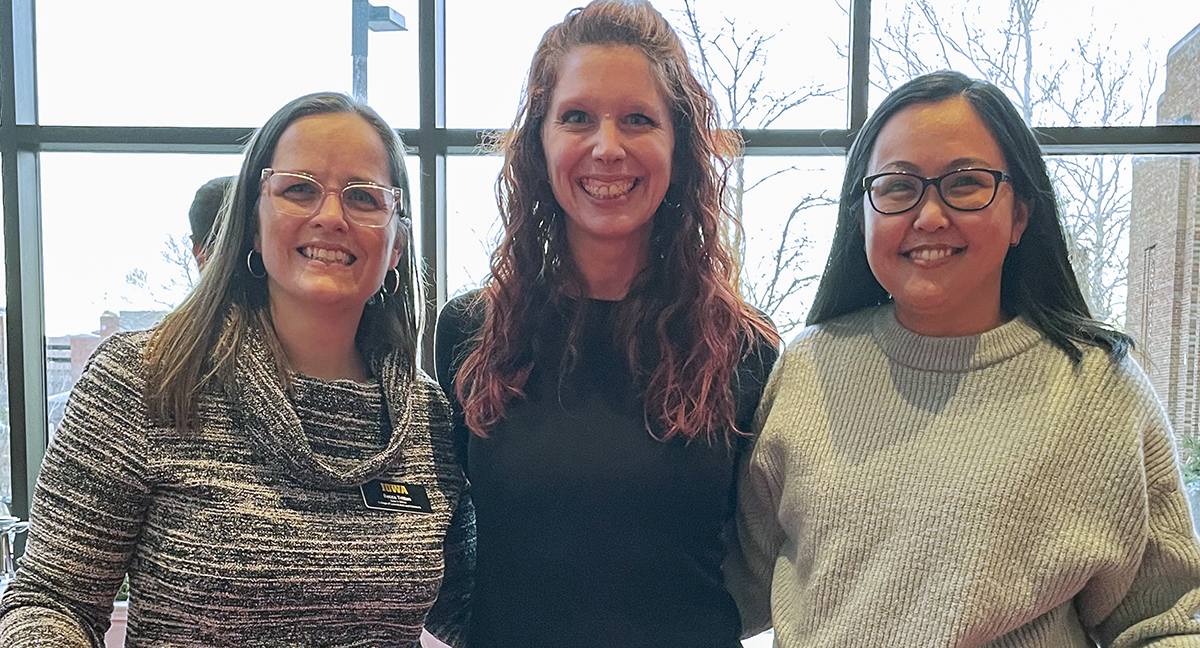Breadcrumb
Training Fills Workplace Gap

Training fills a current workplace gap, but professional development represents the future of an organization.
If one agrees with those definitions, stakes are high for any organization – such as the College of Liberal Arts and Sciences – to advance the capabilities of its staff. So how are CLAS staff members developing the talents and abilities they bring to their workplaces within the College?
A recent conversation with three staff members, Rosie Santo Domingo, Tiffany Schier, and Becca Tritten, provided insights as they shared their professional journeys. Interestingly, all have worked at some point in the Department of Theatre Arts, and perhaps more significantly, all have been able to advance their careers within CLAS, taking on new roles and increasing their professional responsibilities.
Rosie is currently a division administrator in World Languages, Literatures and Cultures, while Tiffany and Becca Tritten work in CLAS Administration. Tiffany is an administrative services manager, and Becca holds the title of administrator.
The discussion focused on three broad avenues for professional growth: workshops and training courses; informal communication; and campus networking.
All agree that trainings from Iowa’s Human Resources present a valuable and broad swath of topics. (Many are referenced on the CLAS Staff Council’s Professional Development webpage: https://staffcouncil.clas.uiowa.edu/professional-development). Topics are as diverse as leadership, personal well-being, and tips on de-coding complicated financial statements. Staff members are also encouraged to apply for financial support to partake in self-selected courses, conferences, and workshops.
If Rosie, Tiffany, and Becca are a representative sample, however, building professional know-how is more often shaped within CLAS by less structured means.
“I would not have survived my first year at Iowa without the amazing notes Tiffany left for me and her constant willingness to share information,” said Rosie, who succeeded Tiffany in her position in the Department of Theatre Arts, adding that Tiffany was also unendingly gracious with frequent follow-up Email questions.
While procedural information – such as that found in a guidebook or ‘professional bible’ – is helpful, Tiffany said, professional growth also thrives on a collegial atmosphere, a supervisor’s sincere desire to see employees flourish, and honest communication.
“Transparent communication was something I did not always experience in my work in private industry,” she said. “My supervisors here at Iowa have been so willing to have frank conversations with me about my current job and what I wanted to do next, then figuring out the steppingstones to get there.”
Becca agrees that a collaborative approach bolsters careers. “It’s not just about being a supervisor, it’s understanding that I learn from those I supervise too. It’s supervising, but it’s also collaborating. You are more productive that way, grow faster that way, and gain greater and more enriching resources that way.”
Equally important to formal and informal on-the-job learning, the trio say, is relationship-building via cross-campus service activities – such as committee work. Those professional networks can lead to a welcomed camaraderie and a knowledge of resources needed for the next job promotion.
“I learned to say, ‘yes’ to things,” Becca said, offering up her stint on staff council as one experience that built confidence, polished her communication skills, and formed networks with campus colleagues. Along with leaning into those opportunities, Becca readily admits, the unwanted symptom of fear crept into those otherwise-positive experiences. She got some great advice, though: “A colleague told me fear can be good. Fear will help you grow.”
Among the formal – or less informal – paths to professional growth, is one more important than the others? All are important, they say, but perhaps at different times. For example, when an answer is needed quickly, it’s a good idea to tap into the expertise of a colleague. However, an upside of registering for a formal course is that it compels the employee to carve out time for self-development.
Which brought the conversation back full circle to the opening quote: how can CLAS Staff Council and CLAS leadership support professional development of its staff?
The discussion ended with creative brainstorming:
- Ensure that new employees understand that professional development is viewed positively by the University Iowa; employees need not fear that advancement would be viewed as threatening to their supervisors, who need to keep positions filled.
- Review selected HR classifications: are some so broad or so narrow that advancement is prohibitive?
- Develop a unified narrative in CLAS for professional development and underscore its importance.
- Extend the on-boarding process. Not only should new employees be encouraged to skill-build, but opportunities for professional growth might be suggested by HR throughout an employee’s career.
- Explore solutions for employees who find time barriers – due to too many work tasks or schedules – prohibit their professional development.
- Expand the capacity of PD courses, as popular offerings are often filled within one day of announcement.